One to watch: Alleged Voter Fraud in North Carolina
Voter ID supporters are pointing to a report from the North Carolina Board of Elections as proof of ongoing Voter Fraud. But, while long on facts, the report has yet to reach any such conclusions.
This past Wednesday, the North Carolina Board of Elections released a report to the State Assembly detailing potential voter fraud cases during the 2012 election. In particular, the report, based on a cross-checking of voter records among 28 states, found the following three major irregularities:
- 765 voters whose first and last names, dates of birth and last four digits of their Social Security numbers exactly matched a voter registered in another state and who voted in both states.
- 35,750 voters with matching names and dates of birth who voted in North Carolina and another state that year.
- Approximately 50 instances of votes attributed to dead people.
The report has been seized upon by numerous right wing media outlets as definitive proof of the voter fraud and the need for Voter ID systems. For example, PJ Media’s headline proclaims: Massive Voter Fraud Discovered in North Carolina’s 2012 Election.
However, digging into the facts, such conclusions seem rather premature. In fact, the North Carolina Board of Elections is the first to stress that they don’t yet know whether or not this is fraud:
“Whether or not this data is actually indicative of fraud, that is subject of an ongoing investigation,” said Joshua Lawson, State Board of Elections spokesman. “There are really kind of two options: one, it’s voter fraud and an individual is voting in two states, which they’re not permitted to do,” he said. “Or there’s a clerical error being made at the polling station in one or both of the states.” (source: Report Shows Voters In Different States, But Is It Fraud?)
Keeping that caution in mind, there are a number of other points to consider. The 35,750 people sharing the same first and last names and DOB seems massive at first glance. However, as MSNBC’s Zachary Roth points out, research suggests that this is more common that one might expect:
The political scientist Michael McDonald and election law scholar Justin Levitt have shown in a detailed statistical study that the number of people who share a name and birthdate is much higher than it might at first appear. (Just for fun, take the RNC’s Spicer. Though his name is less common than many, online records show 20 different Sean Spicers who were born on September 23rd, his birthday.) That statistical reality, McDonald and Levitt conclude, has big implications for how to treat potential cases of illegal voting.
And, writing at ThinkProgress, Josh Israel also notes:
North Carolina used a default date of birth of 01/01/1900 for voters whose date of birth could not be ascertained — Joshua Lawson, a spokesman for the North Carolina Board of Elections, confirmed to ThinkProgress that one of the 35,750 voters had the same name as an Arkansas voter who was listed with that default date in both states. And, of course, sometimes multiple people with the same first and last name are born on the same date. A quick ThinkProgress public records search found both a John M. Smith in Mississippi and a John J. Smith in South Carolina were born on May 15, 1979. Since the database does not compare middle initials, North Carolina would likely flag these John Smiths as one possible double-voter. Indeed two John D. Smiths were apparently born on August 14, 1974 in opposite parts of Illinois.
Turning to the issue of zombie voters, the Board of Election notes that it is entirely possible that beyond clerical error, some of the cases may be attribute to individuals who died after they mailed in their absentee ballots (more on absentee ballots in a moment).
That leaves us with the 765 voters who shared the same first and last name AND the last four digits of a social security number of someone who voted in another state. Again, clerical error and coincidence may apply here.
They key take-away, for the moment, is that a significant amount of digging needs to be done before declaring the scope and size of voter fraud.
Even if every one of these cases was to be eventually proven as voter fraud, the implications for Voter ID are still somewhat unclear. For example, it is most likely the case that some of such fraud would have been committed through absentee balloting — something that most Voter ID systems do not address. Likewise, even advocates of State-based Voter ID admit that such systems offer little protection against inter-state voting.
One also should ask if the potential negative ramifications of Voter ID systems are worth the protections that they offer. The 765 voters with same names and social security numbers represented .017% of the approximately 4.5 million votes were cast in North Carolina in 2012 (see second update below for more on this point). It will be interesting to see how that compares against the number of NC voters who will be turned away from the polls or have to cast provisional ballots due when the state’s new Voter ID law takes effect in 2016.
Regardless of one’s feelings on Voter ID, the investigation in North Carolina will be very important to watch. For the moment however, for all the noise, there is very little in the way of actual conclusions to be drawn from this case.
Update 1: I’m pleased to see that my OTB colleague Dave Schuler had much the same reaction to this news. As always, his opinion is worth reading.
Update 2 [4.5.2014]: It’s worth noting that one 2014 Congressional Race in North Carolina could have been potentially swayed by less than 765 votes. In the 7th Congressional district, Democrat M. McIntyre defeated Republican D. Rouzer by only 533 votes. I suspect that a lot of attention will be on this district during the investigation that follows.
(Hat tip to regular commenter John425 for bringing this story to my attention).
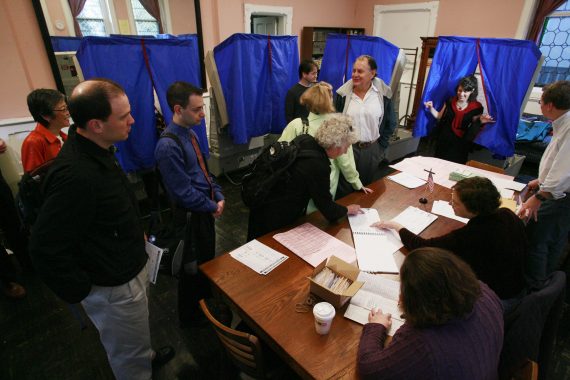

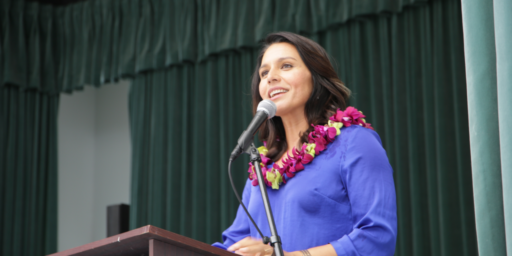
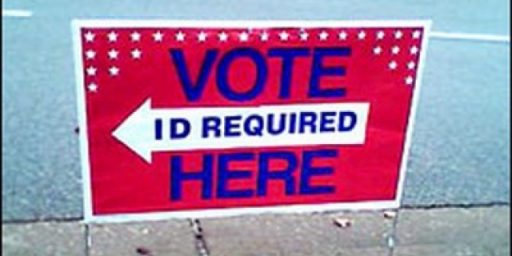
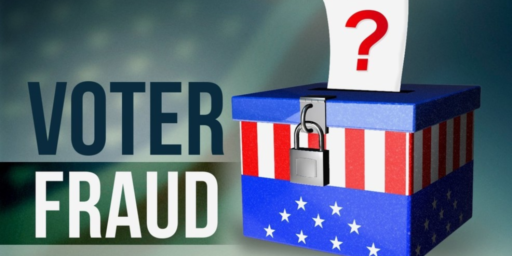
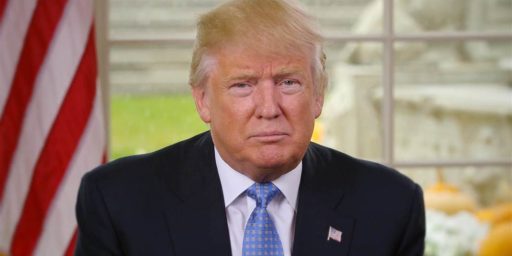
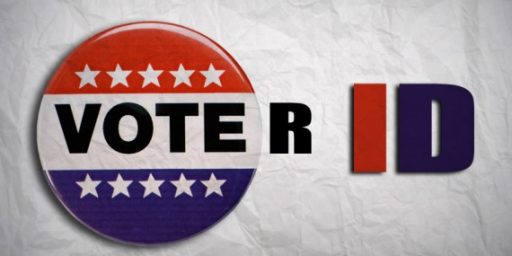
I’m going to ask here a question I asked on Twitter that received no response.
How does banning Sunday voting and restricting early in-person voting deter voter fraud?
@stonetools: It doesn’t. The primary argument there is fiscal, since it does cost the state money to operate early voting poll stations. It doesn’t cost them a lot of money, but hey, it’s an excuse.
In-person voter fraud is difficult on its own as my mother the poll worker will tell anyone if prompted: the poll workers usually come from the areas their stations are in and tend to be gossipy women who know everything about everyone.
This reminds me of the Ripley’s Believe it or Not script about three men with the same first name and surname but different middle initials all having the same Social Security number.
When they looked at dead people voting in Oregon (hope I have the correct state), they found that the spouse of the dead person received the ballots in the mail and just voted the way they thought their deceased spouse would have voted. This is a problem with absentee voting. I suspect those of you with relatives in their 80s and 90s could see how this would happen. Fraud? Yes, but voter ID wont stop it.
Steve
I love this. The NC Board of Elections may well be on the verge of showing actual voting fraud. The kind of voting fraud that does seem to actually exist and that the GOPs have so far managed to avoid acknowledging – double voting by people with two residences. People with two residences are assumed to lean GOP. The GOPs would love to find any evidence of voter fraud, but NOT this kind.
The problem with conservatives is that they believe their own BS. The GOP board members may actually believe they hate all voter fraud and are expected to find all forms of fraud. I expect they’ll get straightened out shortly.
@steve:
When you do the research into documented cases of voter fraud, fraud via absentee ballots far outstrip fraud at the polls. And as you correctly point out, this issue is rarely addressed by Voter ID efforts.
@gVOR08:
Correct. And again, this not easily prevented using State issued Voter ID which historically is solely concerned with in-state residency.
Likewise, its entirely possible that some of these individuals don’t realize that they are committing fraud. In other words they might vote in state-wide races in both locations and only in one location for President (the only national race on either ticket).
It will be interesting to see, in a deep dive on this data, how many of these “dual registration” cases involve in-person voting versus absentee ballots.
That was much my conclusion when I posted on this subject yesterday. There’s clearly smoke there. Just how much fire is another question.
@gVOR08:
Why would you think that? I would think, for example, that the snowbirds who vote absentee in New York and live in Florida (or vice versa) would mostly be Democrats.
@Dave Schuler:
“I would think, for example, that the snowbirds who vote absentee in New York and live in Florida (or vice versa) would mostly be Democrats.”
They are likely a mixed bag, but recall that snowbirds are typically people who (1) are retired and (2) have enough money to afford two houses. Both make them likely to lean R.
@Dave Schuler: What @Moosebreath: said, plus what I think doesn’t matter, I’m pretty sure the GOPs think they lean R.
@Matt Bernius:
Indeed. However, absentee and mail-in voting is popular among seniors, who lean Republican and thus vote the “right way.” Thus the so called “voter ID” laws don’t do anything to restrict that kind of voting.
I must say, I don’t understand how ANY of these voter suppression schemes survive judicial scrutiny. Their intent to suppress voting, as opposed to deterring voter fraud, is blatantly obvious.
So we can squelch peoples ability to vote…but not their ability to pay for corrupt politicians.
Seriously…SCOTUS is totally f’ed up.
Stewart is a must watch on this…both parts.
http://thedailyshow.cc.com/videos/74yxyf/donors-unchained
http://thedailyshow.cc.com/videos/rhxiqo/donors-unchained—quid-pro-quo
It’s times like this I remember that most people don’t understand just how many people live in the United States and how common names really are. Correctly searching for and identifying unique individuals is much more difficult than finding matches that may (or may not) be the same person.
@C. Clavin:
Indeed… and it just so happens that these Supreme Court decisions make it harder to elect the Democratic Senators or Democratic Senators that would appoint Supreme Court Justices that would reverse these decisions. Anyone who doesn’t think this is happening according to plan hasn’t been paying attention.
@Matt Bernius:
It’s not your fault, but if you knew anything about how elections are conducted, you’d know that absentee ballot fraud is, by far, the worst method one can use.
In most states, there is a window prior to the election in which a voter can request an absentee ballot from the Board of Elections. Requests for absentee ballots are public record and any campaign or any political party can request the list of voters who have requested ballots in order to try to convince those voters to vote for their candidate (which most campaigns do.) This also acts as a deterrent to fraud since if I have a list of absentee ballot requests, and I find that these people are dead or not living at the address that the ballot is supposed to be sent to, or if I contact them and determine that they didn’t request a ballot, and ballots are returned in those names, I can challenge those ballots prior to their inclusion in the election results. There is a paper trail. There are signatures that can be examined. It’s actually very hard to get away with absentee ballot fraud, if someone is vigilant. Which is why there are so many more documented cases of it.
Probably the best way to commit voter fraud would be how the Democratic machines did it back in the day. They just had the election workers throw away ballots or stuff ballot boxes with votes for their preferred candidates. Now, with electronic voting machines in many states, it’s much harder to do that.
I’m not arguing that voter fraud is rampant, but to use the number you came up with of potentially fraudulent voters in North Carolina, 765 votes could have flipped the Presidential election in Florida in 2000.
@stonetools:
If you’re looking at the wider culture and news, yes. If you’re just analyzing the law as is, which some judges do, it doesn’t immediately appear that way.
Birthday paradox?
@Gavrilo:
I thought Bush’s window of victory was somewhere in the low thousands. (~3,000?)
@Gavrilo:
Given the complete cluster-F of Florida in 2000, I hesitate to ever cite it as an example of anything other than a complete cluster-F.
Far more relevant to the current data, if it turns out that all of those 765 votes were fraudulent, and all were made in 7th District, then I think there is huge issue. But again, we need the data to see where these votes even took place.
BTW, I’m not discounting the possibility that voting fraud can sway elections, just that when this happens it most likely happens on the local level.
@Tillman:
According to the Wikipedia page:
@Matt Bernius:
I don’t disagree about Florida being a cluster-F. My point is that even a miniscule amount of voter fraud could have enormous ramifications.
@Tillman:
I thought it was one? Bush got five votes and Gore got four.
@Gavrilo: Actually it’s even easier to manipulate the vote with the voter machines since there’s really no paper trail at all with most models.
Well it’s a good thing we have these voter ID laws to help stop people from impersonating THEMSELVES.
@Matt:
No, the only way to do that would be to manually add each fraudulent vote by voting, resetting the machine for the next voter, voting…etc. There is no way to get into the cartridge that actually keeps the count of the votes. Again, vigilance is required. In most states I’m familiar with, you will see both Democrats and Republicans working at the polls as a check on that kind of thing.
Don’t you all remember all those people who did visit the White House, but then didn’t, because someone else had the same name?
Or all those voters who didn’t get to vote because they shared the same name as someone who had been convicted?
Or all those people who have problems flying because they share the same name as someone on the no-fly list?
@Dave Schuler:
New York =/= Democrat. As I’ve pointed out on a couple threads, WNY and CNY are pretty solidly red. Snowbird means money, means a good job and free time. Remember Buffalo is the 3rd poorest metro area in the US and Rochester is the 5th. Around here 30K is a good paying job so a second home is not really in the cards.
@KM:
Looking at the metro area, at least in Rochester’s case, doesn’t really tell the whole story. While the Rochester city proper has huge sections of poverty, it also has large sections of affluence. Further, looking out to the immediate suburbs — especially on the East Side — there is a lot of wealth. Controlling for race and location, I think you’ll find the median income is higher than $30K.
The wealth level then drops again once you push pass the suburbs and get into the rural areas.
And knowing some Rochester snowbirds, a number of them are reliably blue. Especially because many got their wings thanks to buyouts from middle management positions at Kodak and Xerox.
Ultimately, having a second home probably doesn’t tell you as much as one might think about political persuasion. However, looking where that second home is located might be a far better indicator.
Here’s a list of what probably is the 13 most common combinations of first names and surnames:
But since we are also talking about birth dates, lets not forget that a lot of of first names have periods when they are more popular, here’s Douglas for instance (I would guess that the sharp rise has something to do with Douglas MacArthur) and here’s Doug. So despite there being a lot less Doug Smiths than James Smiths, there still probably are quite a few Doug Smiths being born between 1955 and 1965 who share the same birth date with another Doug Smith. Also, those Dougs born between 1955 and 1965 are all in the age group with the highest voting percentage in 2012, 45-64.
And I’d love to see the lists of those 35,750 and 765 names…
@PJ:
Having read the stastical study by Michael McDonald and Justin Levitt, I notice that also bring that up, but the most interesting thing from that study is this:
They did something similar in Louisiana back in 2007! And they found 55,000! This is widespread beyond belief!
@PJ:
Combine that with the birthday problem and you get a lot of matches. A group of 60 has better than a 99% probability of a shared birthday, up that to over a thousand and you are bound to have a lot of matches. Adding in SS#s will drop that, but matches of last 4 are still likely.
What’s irritating is that let’s say the study shows, as others do, that the problem of voter fraud is slight. Does that mean that North Carolina will repeal its voter suppression scheme? Hardly. They’ll just come up with some over bull sh!t excuse why they need to maintain their scheme, all the time denying the real reason: that they want to suppress the number of “those people” voting.
I’m betting that the DOJ are going to be all over this like white on rice. Unfortunately , the Republicans do have their trump card: Lord Justice Plutocrat and his delusional allies on the Supreme Court, who seem to think that white ssupremacy in the South no longer exists. I’m hoping that Kennedy , who has some sense of individual rights, will side with the liberals on this.
Nonsense, we were assured days ago in this very URL by Dr. Joyner that vote fraud was a Republican fantasy.
It’s not like any elections are ever decided by less than 0.017% percent of the vote.
In 2006 the Poughkeepsie Journal in NY had an article about voter fraud, or potential voter fraud.
Sounds pretty alarming, 2,600 dead people voting. They only examined these cases in their local county and in every one it was a simple mistake. For example:
http://www.poughkeepsiejournal.com/article/20061029/NEWS01/610290381/Deceased-residents-statewide-voter-list
@charles austin:
How many are you willing to disenfranchise to protect against that rare occurance?
@charles austin: No, you weren’t. I’ve been very specific on this for years: The type of voter fraud that would be fixable by requiring picture ID is essentially non-existent. I think there’s all sorts of fraud with absentee ballots. And I think it’s possible that a small but nontrivial number of people are voting at a former home or vacation home and another locality. There’s just no evidence that people are showing up at the polls, claiming to be some other person, and voting as them. That’s just way more risk and trouble than it’s worth.
@James Joyner:
Along with my favorite voter fraud urban legend – the busloads full of illegal immigrants being schlepped in by the Democrats. Even though this supposedly happens in every single election, and with all the camera phones out there, no one has ever been able to get some photographic proof. Maybe they’re all vampire voters and don’t show up on film!
@Moosebreath: Easy assertion, but where are the facts behind it?
Ok downvoters… I realize that @Gavrilo tends to take what most commenters consider unpopular positions, but seriously @there is nothing in this comment that warrants any downvoting.
Or if someone can point it out, please do.
@charles austin:
Not only do you misrepresent James’ position (as he points out), but you seem to miss the broader point of this post — namely that for all the smoke, no fire has yet to be demonstrated in North Carolina.
None of us are saying that voter fraud is impossible. Simply that if you are going to say that its widespread, you need to actually… you know… prove that its going on.
BTW, this is exactly the same claim that Voter ID folks (fairly) make about disenfranchisement.
Without actual data, we are having philosophical arguments, not factual ones.
@Gavrilo: Uh actually most of the touch screen voting machines can be wiped and reprogrammed with a simple USB setup. Have you missed the uproars in the tech community over how easy most of the touchscreen voting machines are to hack?
@Matt:
Gavrilo’s point, I believe, is that actually accomplishing that hack is difficult to do in actuality because of how regulated the machines are while in use.
To that point, last year I did serve a poll watcher for a local party in a village election. As Gavrilo pointed out above, watchers were there from the moment the machines were activated (and all were given the chance to review and approve the diagnostics), to the moment voting stopped and the tallies were run.
With these machines, based on the set up of the polling places, it would have been difficult, if not impossible for anyone to slip a USB key into them. And, frankly the only person who would have been able to do it would have most likely been the tech who was overseeing them. But even that would have required doing it without any of the party poll watchers noticing.
Is it impossible? Of course not. But highly unlikely. Especially if doing so would require the machine to reboot or in any way halt operation.
@James Joyner:
Correct. And to your broader point — current Voter ID laws would not stop this.
Again, if someone can explain how State (vs National) ID prevents this from happening, feel free.
Oh and I’m still double registered despite honest efforts to fix it. I moved to Texas in 09 and before the year was over I had switched over to a Texas drivers license and car title. Apparently Texas never bothered to tell Illinois that I had turned in my Illinois driver’s license. I know this because they sent a jury duty summons to my old address. I had to call a number fax some papers call another number send another letter and STILL I am registered to vote in Illinois. I was wasting so many hours trying to get this fixed that I just gave up.
If I get a chance to head up north to see family I’m planning to try to get it fixed in person.
@Matt Bernius: I know the ones down here would be fairly trivial to modify.
Not to mention the degree to which these people are amateurs and do stupid things while the voter rolls etc are in their custody.
Frankly I’m almost more worried about the people involved then the machines.
BTW, in all seriousness, is it illegal to vote in local elections in a locality where you maintain a (second) residence?
It seems to me to be fundamentally anti-Democratic, if you are living in a location part time and paying property taxes there, not to have some say in the structure of local government.
@Matt:
Again, at least in my experience, the machines were set up at the beginning of the day, the people on site verified they had passed all checks and were zeroed out. As soon as polls were closed, a switch was thrown and they cranked out the results, with a paper trail.
At no time were the machines out of view of the parties representatives.
That said, I don’t understand how things work in other areas. For example I’m still baffled by the case of that district election official who in either 2008/2012 went home with all the votes without every declaring a winner or calling in the results and people had to more or less bang on her door in the middle of the night to get the results.
But in a case like that, it’s not a technology failure. It’s a human failure.
BTW, if Dave Schuler is still watching this post, he may be able to comment on the electronic voting thing in far more detail as he was apparently involved the design of one such system.
Dave?
@Matt Bernius:
It is still easier and more likely than the scenario he is worried about, the dumping of ballots and then stuffing the ballot boxes.
@Matt Bernius: That happened in Waukesha County Wisconsin. Not once but twice the same official did that or reported new numbers later that night. It is a suburb of Milwaukee and is very right leaning but really wasn’t looked into. Those 14,000 uncounted votes switched the election from Kloppenburg to Prosser. It is also the county that twice gave Walker more votes than any of the other 71 counties. And it is also my old home district.
@Matt Bernius:
The obvious questions to ask in that case are how regulated the machines are when they are not in use and what sort of tests are run on them to verify integrity before they are used. If those integrity tests are based on the output of code that is running on the machines themselves, they are unlikely to be definitive.
@Tillman: “The primary argument there is fiscal, since it does cost the state money to operate early voting poll stations. It doesn’t cost them a lot of money, but hey, it’s an excuse.”
First, when the policy remains the same but the reasons vary, they’re lying – we’re seeing that now, as the reasons vary, but the policy remains constant.
Second, the state undoubtedly pisses away far more money for far worse things every single day of the year.
BTW, Matt – thanks for posting this!
I’d add that the population of NC is 9.75 million. 37000/9,500,000 =0.3%
If the average American voter moves interstate every 10 years, ….
@Matt Bernius: Ohio resident here. I downvoted it because his assertion is an out and out lie. It happened here on the touchscreen machines – people clicked one name and a vote was registered for the other candidate.
@Dave D: Yes and that wasn’t even the only such example of that happening.
@Blue Galangal: Indeed there’s video of at least one machine doing that.
I remember the GOP raising a bit of a stink because some machines were switching votes to OBama..
@Dave D:
Thanks, the mention of Prosser brought it right back.
@Blue Galangal:
I do remember that. But , if I remember, when those votes were switched, the person voting was able to see that they were switched and have the vote disqualified. If you’re trying to steal an election, telling each person their vote was just switched isn’t the best way to do it,
Most of the concerns about using hacking to change electronic vote counts involved invisible switches.